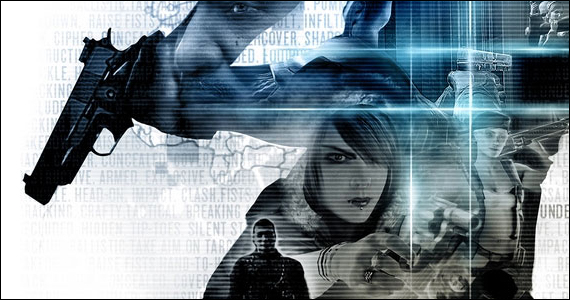
With Alpha Protocol, Obsidian Entertainment has opted to take a break from their usual routine of producing sequels to established high-profile franchises in the hopes of establishing a lucrative IP all their own. Despite drawing quick comparisons to Bioware’s Mass Effect, Alpha Protocol is clearly it’s own game, though this is as often to its detriment as it is to its credit.
You control Michael Thorton, agent of the eponymous Alpha Protocol, who quickly becomes embroiled in an international mystery that’s equal parts deep and deeply confusing. You’ll be required to employ stealth and brute force to complete your missions, while, more uniquely, using your wit to navigate the conspiracy in which you’re entwined. The game offers a number of intriguing innovations designed to immerse players in the espionage experience, and many of these are admirable attempts—but a critical lack of development and numerous design flaws leave the experience awkward and unsatisfying.
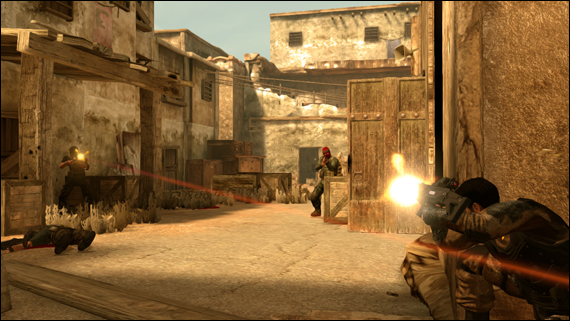
As the game begins, you’ll perceive that something is amiss almost immediately. The cover system is hopelessly crude; you will often find yourself standing directly in front of a box or other obstacle, uselessly tapping on your controller and wondering why Thorton refuses to get into cover. Perhaps on your third attempt—if you shimmy yourself just right—he will finally obey your command, but by this time you have already taken enough damage and alerted enough enemies that you probably would have been better off just running somewhere else. Now that you’re in cover, though, you have other problems to contend with, not the least of which is the constant grenade spam from your enemies. This would not be so problematic if you had the usual tools for cover navigation, but you don’t. Thorton lacks even the rudimentary ability to vault over cover, which massively hampers your navigation of the battle. This feature is so ubiquitous within cover shooters that its omission has become counter-intuitive; you’ll try to use it even after realizing you can’t do it, and when you finally adapt to the inability, you’ll still be crouching behind cover wishing you could do it. You do have the ability to dash from one obstacle to another, or perform the “SWAT turn” when taking cover in a doorway, but it’s usually unclear whether items are within your range, or if you have positioned your analog stick correctly to trigger the movement, which will often leave you standing out in the open after attempting to perform such a maneuver.
The designs flaws don’t end there. The inability to locate your enemies is a constant obstacle; the camera is crammed so far up Mike’s backside that your perception of the environment suffers massively. Visual design is a disaster, presenting bland levels and design choices that can actively hamper your gameplay. For example, if one activates a slow motion ability, the screen is suddenly filled with an intense yellow light—as if the player were staring directly at the sun, or perhaps an atomic blast—obscuring your vision and making it impossible to target your enemies. Weapons handle miserably, with ludicrous inaccuracy. While character faces are rendered capably, your customization options for hair and clothing range from mediocre to outright cartoonish. Animations are stiff and unnatural, and largely feel inappropriate for the atmosphere the game is attempting to create.
Crouching is perhaps the worst offender of all, with Mike hunching over and tip-toeing hilariously around the map. While this position affords you some relief from the cramped camera, the pain of watching this is a near physical sensation, and you simply won’t be able to keep it up for long. Other notable disasters include Mike’s ability to drop down from ledges, triggering an overactive animation in which the camera jerks crazily, robbing your of your orientation and any ability to perceive the positions of your opposition.
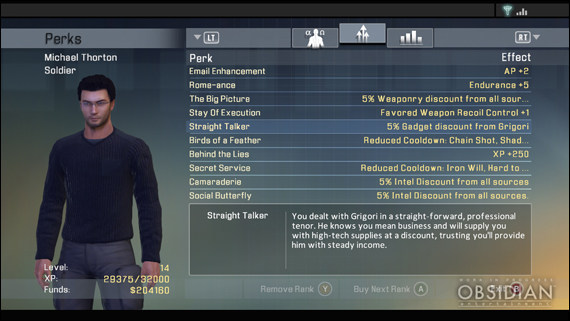
Relief is available, though, in the impressively deep customization system. There are numerous skill trees, each offering a slew of specific abilities which can dramatically alter the way you play. Thorton has the opportunity to specialize and re-specialize, affording players the opportunity to change their stats if unsatisfied with their leveling choices in the early missions. There’s a lot to discover in the skillset: stealth options, buffs, and advanced combat abilities like the option to perform a Splinter Cell: Conviction style mark-and-execute maneuver. Though your options may ultimately describe either a stealth or guns-blazing approach, the minutia here grants admirable flexibility in either path.
Design of the stealth mechanic, though, is curious. Somewhat boring and tedious, the design presents no legitimate feeling of stealth or cunning; Mike simply becomes more difficult to see as his levels increase, and is afforded superpowers like invisibility or the ability to run without making any noise. Fans of stealth games will understand immediately that this is not the way to design a stealth mechanic. More damning is that whether or not you are detected often feels random; it rarely feels as if the player is controlling the situation. You’re not Sam Fisher or Solid Snake: you don’t use your environment to your advantage, you don’t have clear tools for given situations, and there are rarely designed challenges for you to overcome. Instead, there is merely a room full of pacing enemies who may or may not see you as you scuttle stupidly behind boxes. The problem is only exacerbated by the fact that the game constantly recommends stealth. Despite your specializations, your handler will always advise the stealth approach, making you feel like you’ve failed when the half-baked mechanic decides that you’ve been exposed.
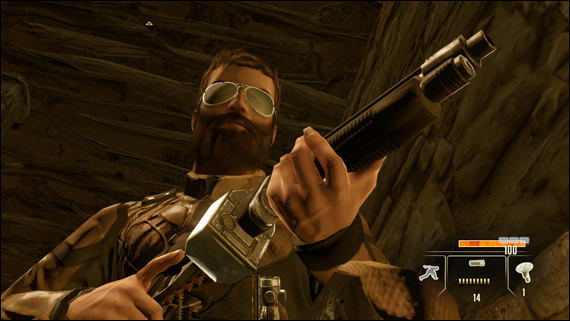
This is one of the larger problems in Alpha Protocol: the game often makes the player feel like a chump. If it’s not the unsatisfying stealth mechanic, it’s Mike’s woeful weapon handling; if it’s not the absurd animations, it’s the broken cover system. For a game whose presented goal is to provide a satisfying spy simulator, this failing can become infuriating. The reality is often that you’re not elite: you’re a borderline incompetent stumbling awkwardly through terrorist compounds, surviving only by the grace of AI that’s even more retarded than you are. Mike’s dialogue (and stiff animation during conversations) aggravates the problem; regardless of what attitude you choose, you rarely sound much like a spy. While you may adapt to the design inadequacies, and your progression will afford you superior abilities for dispatching enemies, the game never truly surmounts these fundamental flaws to offer a satisfying gameplay mechanic.
These missteps might represent complete failure for Alpha Protocol, if not for the saving grace of the games driving force: choice. Alpha Protocol, like Mass Effect, is beholden to the philosophy that your choices should have consequences. However, in Mass Effect these consequences seem to exist in some distant future state; they often do not affect the outcome of the game you’re playing, but instead promise to bear fruit in some future entry. The reality is that there’s usually a way to do everything and anything, regardless of your past choices, with the main feature of your decisions sometimes totaling your progression on the morality scale. Not so in Alpha Protocol: the consequences of your actions bear down on you with startling immediacy. Every character is a potential ally or enemy: the choice of who to befriend and who to antagonize, who to kill and who to spare constructs a game where entire paths open and close before you, presenting you new opportunities as often as snatching away others.
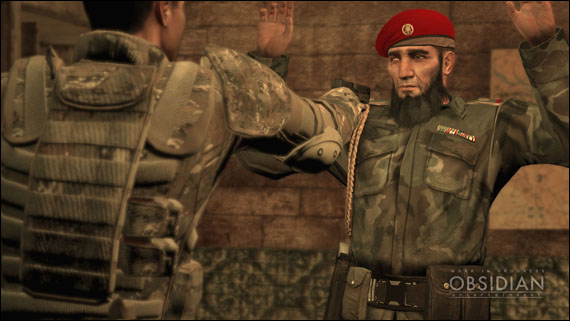
This is the greatest strength of the game. This intricacy here is remarkable; characters have radically different responses based on your actions and attitude, and rarely is anything as it seems. An informant may appear to respond to your approach, and then spill his guts to your enemy behind your back. Enemies who try to murder you on sight may become your most reliable allies, and your ostensibly reliable allies may later try to murder you on sight. You’re afforded a wealth of options for turning characters to your cause, or twisting the knife in their backs—dialogue, emails, sabotage, intelligence sharing and illegal favours; it all adds up. It’s clear Obsidian understands the appeal of the spy thriller, and they’ve engineered an impressive machine for navigating the twists and turns of that world.
Unfortunately, the trade off here is often with clarity: the branching nature of the game—and perhaps some weakness in the scripting and construction—means a significant loss of coherency; you’ll often feel lost as to what’s happening, what you’re doing, what your choices are and why they matter. The time limit on conversations and vague attitude dialogue options can result in some choices feeling random, with the player having little idea of what it is they’re about to say.
Players familiar with Mass Effect will immediately recognize the conversation system: agent Thorton has a set of differing dialogue options to choose from with each reply, with saying the right or wrong thing having different results. However, it will quickly become apparent that the similarities end there. Conversations occur only when the game dictates, and they happen only once—so you’d best be certain of your choices. You can’t backtrack because you forgot to ask an important question, and oftentimes pursuing one element of the conversation means sacrificing the others. This mechanic is compounded by a ticking clock that offers you only a few seconds to make your conversational choices, requiring you to listen carefully and think quickly. This succeeds only as often as it fails; while there’s some novelty in having to think on your feet, there’s often not enough time to fully consider your options.
Instead of choosing sentences in the conventional sense, the player chooses between three attitudes: professional, aggressive, or suave—seemingly designed to emulate the approach of Jason Bourne, Jack Bauer, and James Bond, respectively. Certain characters respond to certain attitudes, and it’s not always clear which—if a character is hitting on you, your instinct may be to respond with the suave option, when in fact the character is looking for you to be assertive and direct. The early sequences—where you are presented with a set of handlers, each responding to a particular and obvious attitude—may leave you feeling as if the system is a missed opportunity, but it later becomes clear that the game was only holding your hand and ensuring your familiarity with the system before tossing you in the deep end.
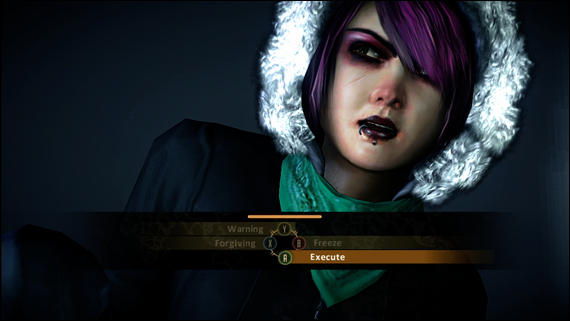
Scripting, however, remains a constant problem. The suave option won’t make you feel like James Bond, but it will make you feel like an over-tanned manwhore who asks girls if they’re wearing astronaut pants at the local bar. The other two attitudes are handled more capably, but the reality is that it’s rarely satisfying to hear Thorton speak for you, and it often becomes outright groan inducing.
Where dialogue within Mass Effect might make you laugh with genuine humor or grim satisfaction, response to most dialogue in Alpha Protocol will be a resounding “Meh.” Still, the system is sound: there’s a way to get to everyone, and depending on how much you’ve learned both on missions and within your wheeling-and-dealing conversations, you may have the information to turn people to your cause or manipulate them to your own ends.
It’s easy to imagine how Alpha Protocol may have started life as collection of great ideas scribbled on a white board; the ideas are all there, and largely they constitute an intriguing approach to the genre of the spy thriller. Unfortunately, it seems as if many of these concepts saw little refinement after leaving the whiteboard, and the result is a game that feels significantly underdeveloped. While the intricate paths and character interactions can be rewarding, Alpha Protocol requires refinement across the board, either in the form of light polishing or total ground up redesigns. If Obsidian chooses to pursue a sequel, the resolution of these problems could produce a truly admirable game, but intriguing ideas alone cannot support the existing product when faced with such a flawed gamplay mechanic.
Alpha Protocol
Developer – Obsidian Entertainment
Publisher – Sega
System – PlayStation 3, Xbox 360, Microsoft Windows (Xbox 360 Reviewed)
Release Date – June 1, 2010
*A copy of this title was provided by the publisher for review